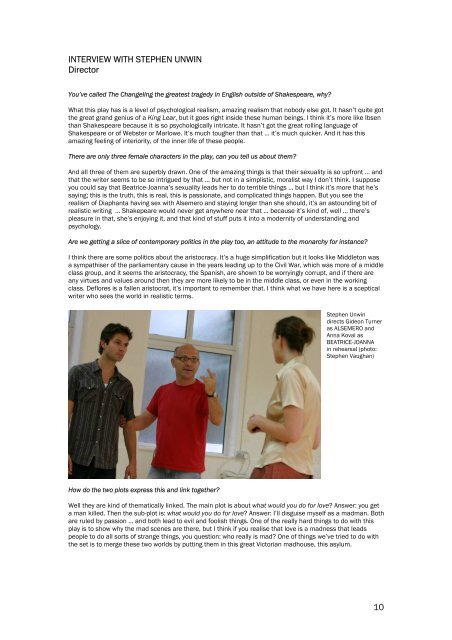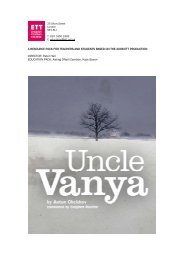Download The Changeling Education Pack - English Touring Theatre
Download The Changeling Education Pack - English Touring Theatre
Download The Changeling Education Pack - English Touring Theatre
Create successful ePaper yourself
Turn your PDF publications into a flip-book with our unique Google optimized e-Paper software.
INTERVIEW WITH STEPHEN UNWIN<br />
Director<br />
You’ve called <strong>The</strong> <strong>Changeling</strong> the greatest tragedy in <strong>English</strong> outside of Shakespeare, why?<br />
What this play has is a level of psychological realism, amazing realism that nobody else got. It hasn’t quite got<br />
the great grand genius of a King Lear, but it goes right inside these human beings. I think it’s more like Ibsen<br />
than Shakespeare because it is so psychologically intricate. It hasn’t got the great rolling language of<br />
Shakespeare or of Webster or Marlowe. It’s much tougher than that … it’s much quicker. And it has this<br />
amazing feeling of interiority, of the inner life of these people.<br />
<strong>The</strong>re are only three female characters in the play, can you tell us about them?<br />
And all three of them are superbly drawn. One of the amazing things is that their sexuality is so upfront … and<br />
that the writer seems to be so intrigued by that … but not in a simplistic, moralist way I don’t think. I suppose<br />
you could say that Beatrice-Joanna’s sexuality leads her to do terrible things … but I think it’s more that he’s<br />
saying; this is the truth, this is real, this is passionate, and complicated things happen. But you see the<br />
realism of Diaphanta having sex with Alsemero and staying longer than she should, it’s an astounding bit of<br />
realistic writing … Shakepeare would never get anywhere near that … because it’s kind of, well … there’s<br />
pleasure in that, she’s enjoying it, and that kind of stuff puts it into a modernity of understanding and<br />
psychology.<br />
Are we getting a slice of contemporary politics in the play too, an attitude to the monarchy for instance?<br />
I think there are some politics about the aristocracy. It’s a huge simplification but it looks like Middleton was<br />
a sympathiser of the parliamentary cause in the years leading up to the Civil War, which was more of a middle<br />
class group, and it seems the aristocracy, the Spanish, are shown to be worryingly corrupt, and if there are<br />
any virtues and values around then they are more likely to be in the middle class, or even in the working<br />
class. Deflores is a fallen aristocrat, it’s important to remember that. I think what we have here is a sceptical<br />
writer who sees the world in realistic terms.<br />
How do the two plots express this and link together?<br />
Stephen Unwin<br />
directs Gideon Turner<br />
as ALSEMERO and<br />
Anna Koval as<br />
BEATRICE-JOANNA<br />
in rehearsal (photo:<br />
Stephen Vaughan)<br />
Well they are kind of thematically linked. <strong>The</strong> main plot is about what would you do for love? Answer: you get<br />
a man killed. <strong>The</strong>n the sub-plot is: what would you do for love? Answer: I’ll disguise myself as a madman. Both<br />
are ruled by passion … and both lead to evil and foolish things. One of the really hard things to do with this<br />
play is to show why the mad scenes are there, but I think if you realise that love is a madness that leads<br />
people to do all sorts of strange things, you question: who really is mad? One of things we’ve tried to do with<br />
the set is to merge these two worlds by putting them in this great Victorian madhouse, this asylum.<br />
10





